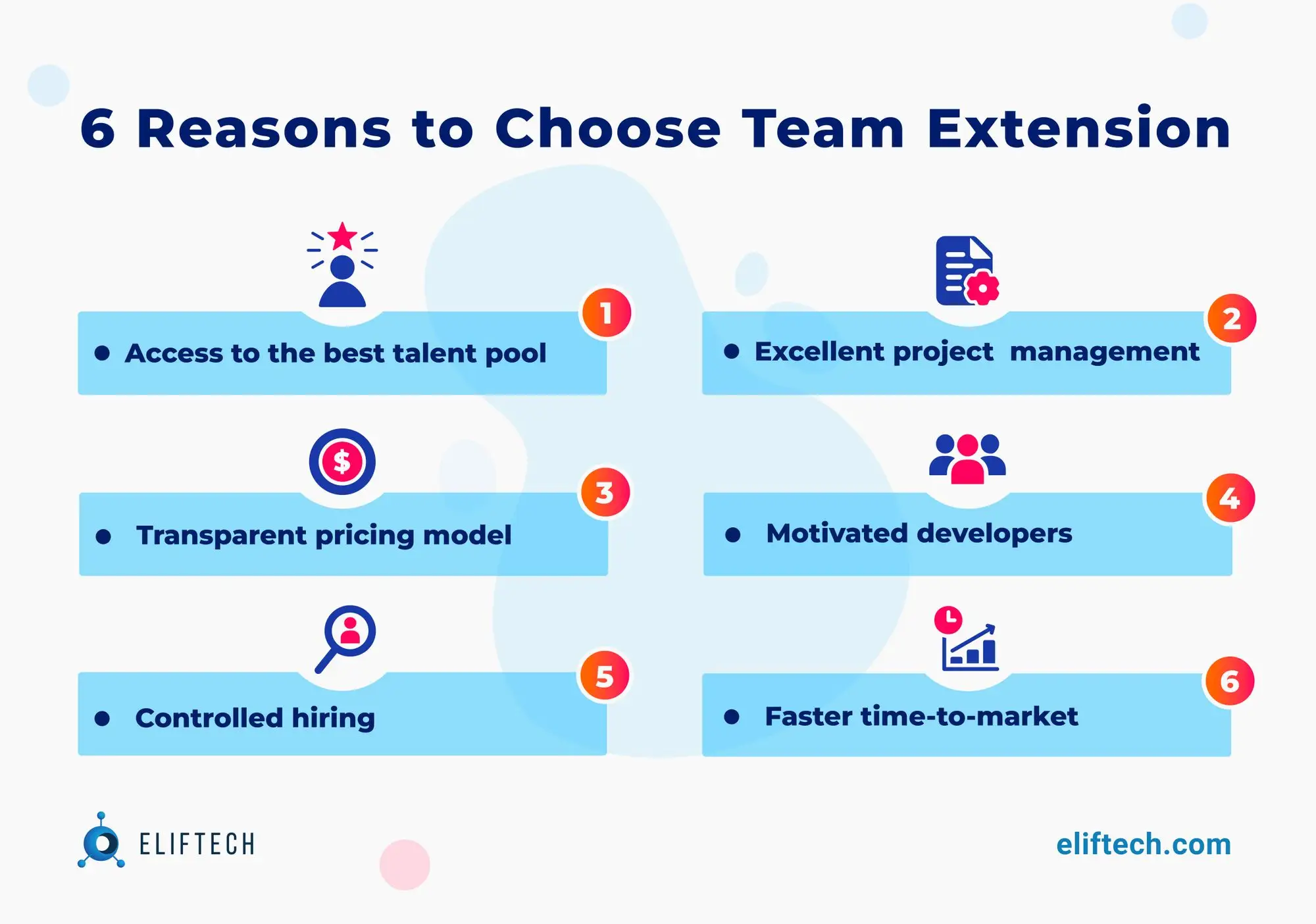Outsourcing
Team Extension: The Secret Weapon to Scale Your Business Effectively

In the race to outpace the competition, businesses must embrace innovation and adaptability. One of the key factors that can help businesses achieve this is having a skilled and efficient workforce.
But finding the right talent to drive your company forward is not as simple as it seems.
That's where team extension steps in. This comprehensive guide will explore the concept of team extension, its benefits for businesses, and how to implement it effectively.
Team Extension for Business: Benefits, Use Cases & an Integration Guide
If you’re looking to expand your business's capacity without increasing headcount, team extension is a perfect compromise for your purpose.
Team extension is a strategic approach that allows businesses to augment their existing in-house teams with additional skilled professionals from an external source, often by hiring an offshore development company.
The primary goal of team extension is to fill the skill and knowledge gaps in the existing team and enhance its capabilities. Businesses can expand their capacity without hiring extra in-house employees, which can be expensive and time-consuming.
Team extension offers businesses the ability to scale operations rapidly, enhance productivity, and reduce costs without expanding their workforce. Additionally, it enables companies to access the expertise of skilled professionals regardless of geographical limitations, providing a valuable resource for project success.
By leveraging team extension, businesses can enhance their workforce and achieve new levels of success. With access to top talent from around the world, companies can fill skill gaps, boost team capabilities, and confidently take on more projects.’
Read more: Choosing Between In-house Development Team & Outsourced IT Services
Team Extension: Main Cooperation Models
When it comes to team extension, businesses have a variety of cooperation models to choose from. Each model offers unique features and advantages, allowing companies to select the one that best aligns with their specific project needs and organizational goals.
Dedicated Team Model
The dedicated team model involves hiring a team of professionals who will work exclusively on the client's projects for a set period. This model is ideal for large and complex software development projects that require specialized skills and expertise.
Dedicated teams help businesses reduce costs while maintaining scalability and flexibility. The team becomes an extension of the client's in-house team, working closely with them to achieve project objectives.
Managed Team Model
In the managed team model, the vendor not only provides a skilled development team but also takes responsibility for project management. This model is suitable for long-term projects that require ongoing collaboration and comprehensive project oversight.
The product owner, who represents the client, plays a crucial role in making critical decisions, communicating with the team, and providing regular feedback. The vendor ensures that the project is executed smoothly, managing resources, timelines, and deliverables.
Outsourced Team Model
The outsourced team model places the responsibility of assembling the team, managing the project, meeting deadlines, and delivering the final solution to the software development company.
The client's primary role is to provide their ideas, requirements, and project vision to the vendor. The vendor takes care of the rest using one’s expertise to deliver a high-quality product. This model is well-suited for businesses that want to leverage external expertise without having to manage the development process internally.
Read more: How Outsourcing IT Department Can Help Tech Startups Stay Agile
When to Use Team Extension Services?
Team extension services are an ideal solution for businesses that have a cohesive in-house development team but need to supplement their current resources with additional talent or expertise. Knowing when to leverage these services can be the difference between meeting project objectives and falling behind schedule.
Here are some common scenarios when companies should consider using team extension services to enhance their in-house development team:
Lack of Expertise or Knowledge
One of the primary reasons companies turn to team extension services is to fill gaps in their knowledge or expertise. This commonly happens in projects that require specialized skills or working with new technology. By partnering with external team extension experts, businesses can leverage additional talent and expertise that they may not have internally.
Limited Resources
Sometimes, local resources are scarce, or their rates are unreasonable. In these cases, businesses may turn to team extension services to access top talent from around the world and leverage their expertise to complete their projects more efficiently.
Complex Projects
When working on large or complex projects, businesses may need additional resources to speed up the development process. Team extension services can provide a cost-effective solution to scale up development and complete the project within the set time frame.
Expansion and Growth
Businesses may use team extensions to facilitate their expansion and keep up with industry trends by leveraging newer technologies and tools. This strategy allows businesses to stay competitive and continuously improve their products or services.
Tight Deadlines
Not having enough time to deliver a project is a common challenge. In these cases, team extension services enable businesses to increase their development capacity and complete the required work in a timely manner.
Hiring Challenges
At times, companies struggle to hire the right professionals within their set timeframe and budget. By working with team extension specialists, businesses can save time, reduce costs, and access top talent without being constrained by geographical limitations.
By leveraging team extension services, businesses can enhance their in-house development team, maintain project momentum, and meet their project objectives efficiently.
6 Reasons to Choose Team Extension
By opting for a team extension, businesses can enjoy numerous IT outsourcing advantages that contribute to successfully completing their projects.

Here are the top 6 benefits of the extended team model:
- Access to Global Talent Pool: Businesses gain access to a vast pool of top tech talent from the international market. This allows companies to expand their talent search beyond local limitations and find developers with the specific skills and expertise they require. Leveraging global talent not only ensures a diverse and skilled team but also helps companies optimize their budget, as they can often find highly talented professionals at competitive rates.
- Transparent Pricing Model: Team extension services come with a transparent pricing model that benefits businesses in multiple ways. Companies have the flexibility to negotiate and agree on hourly rates and discuss monthly fees upfront.
This transparency in pricing makes it easier for businesses to track expenses, allocate resources efficiently, and plan for future steps or project improvements without any surprises. - Controlled Hiring: With the extended team model, businesses have complete control over the hiring process. Companies can review potential candidates' profiles, assess their qualifications, and choose developers with the required skill set. Moreover, companies have the option to conduct interviews and assess how well the candidates fit within their existing team and company culture.
- Excellent Project Management: Businesses can decide whether to manage the project themselves or delegate the task to the vendor's project manager. This allows businesses to adapt project management approaches based on their preferences, experience, and available resources.
With excellent project management in place, businesses can ensure transparency, effective communication, streamlined processes, and smooth coordination within the extended team. - Motivated Developers: The extended team members work full-time on the project, ensuring their dedication, involvement, and quality of work. Members are fully integrated into the project, so it adds a sense of ownership and accountability for their assigned tasks.
- Faster Time-to-Market: The extended team members bring in specialized skills and experience, so their service can help businesses speed up the development process and release their products faster than expected. It provides a competitive advantage and allows businesses to seize market opportunities quickly.
How to Integrate an Extended Development Team?
Once you choose the best IT vendor for team augmentation, the next step is integrating the extended development team into the core team. The integration process involves several steps, starting with analysis and planning, followed by actions such as:
1. Define the Required Specialists: Determine the scope of the project and the main roles required. Identify the skill and knowledge gaps in the in-house team that need to be filled by the extended team members.
2. Set Clear Requirements and Goals: Discuss the project, ideas, and functional and non-functional requirements with the vendor. Together, define the project goals and key performance indicators for the extended development team.
3. Complete Candidate Screening: Select suitable candidates based on their qualifications and skill set. Conduct technical interviews and soft skills evaluation to ensure they align with the company's needs and culture.
4. Start Team Integration Process: Onboard the extended team members and ensure they are fully integrated into all processes and ready to work with the in-house team. Establish open communication channels and use time and progress-tracking tools to keep the team in sync.
Why Choose a Team Extension Company?
A team extension company like ElifTech can offer several advantages, such as access to a large pool of skilled professionals, transparent pricing models, controlled hiring, and excellent project management. Moreover, they can provide a detailed communication plan to ensure clarity of roles and responsibilities and seamless communication throughout the project.
When hiring a team extension company, consider the next factors:
- expertise in the relevant industry;
- case studies & portfolio;
- successful transition cases;
- tech stack;
- reputation on the market (customer reviews, media presence);
- adherence to industry standards.
Look for a vendor that offers long-lasting partnerships and can cater to the specific needs of your business.
In Conclusion
Team extension is a powerful strategy that can help businesses overcome skill and resource limitations and successfully execute complex projects.
By choosing the right vendor and integrating the extended team seamlessly, businesses can leverage the numerous benefits of team extension and stay ahead of the competition in today's dynamic market.
